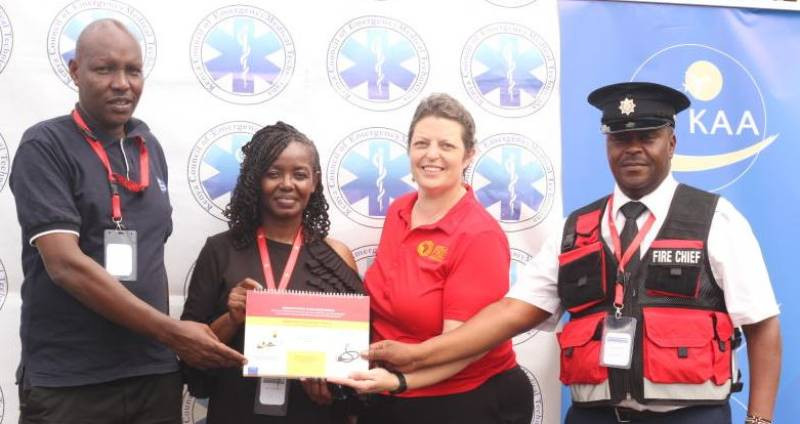
From left: Jomo Kenyatta International Airport (JKIA) Assistant Chief Fire Officer, Geoffrey Cheruiyot, Kenya Council of Emergency Medical Technicians Chairperson Eunice Wanjiku, Africa Fire Mission Executive Director Nancy Moore and Chief Fire Officers Association Chairman Samuel Kahura in Nairobi. [Collins Kweyu, Standard]
Emergency medical technicians have urged county governments to stop unnecessary bureaucracy when dealing with matters of emergency and safety.
Speaking at the Kenya Airports Authority (KAA) training school in Nairobi, the Kenya Council of Emergency Medical Technicians Chairperson Eunice Wanjiku said that too much red tape in counties was hampering quick response to emergencies, leading to unnecessary loss of lives.
She cited the case of firefighters, who are often delayed to respond on grounds that they must get permission or authorisation from senior county officials.
Wanjiku called on Council of Governors Chairperson Anne Waiguru to intervene and ensure that the county bosses are well versed with matters to do with emergencies, have good policies and guidelines on quick response to emergencies.
“Sometimes when an incident like fire or accident happens, it takes long for the county government emergency and response team to arrive because of reasons like lack of fuel, equipment or elected leaders have not given a nod for the county employees to respond to the emergencies,” Wanjiku said at the closure of a six-day training exercise for medical services providers.
The training, which involved 450 participants from security service, fire fighters and ambulance, was supported by Africa Fire Mission, a US-based organisation that sent 34 volunteer instructors.
Africa Fire Mission Executive Director Nancy Moore said that her organisation was willing to send in more experts to train Kenyans on matters to do with emergency and safety.
She also stressed the importance of creating awareness among the general public on what they need to do, or how to handle emergency situations.
KAA General Manager incharge of safety and operations Harrison Machio called for the establishment of a regulatory framework to manage emergencies in the country.
He urged the county and national governments to regularize the Fire Safety Act to ensure responders are well guided.
“Emergency responders should be trained on various areas that need their attention like flooding, road accidents management and fire outbreaks. They also need to be trained on the human aspect when dealing with the emergencies,” he added.
Samuel Kahura, the chairman of Fire Officers Association of Kenya, emphasised that members of the public should be educated on how to co-operate with emergency responders.
He suggested that special areas should be created and reserved for emergency vehicles like ambulances, fire fighters trucks and police vans to use.
“Through education to the public, they will give way for those vehicles when they see them at the time of emergency,” said Kahura.